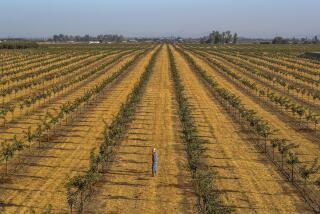Governor Cites Rise in Farm Sales to Japan, Wants More
- Share via
SACRAMENTO — Still seeking the magic formula for selling California rice to Japan, Gov. George Deukmejian told an agricultural trade conference Thursday that exports of farm products to the Japanese have improved, but not enough to satisfy him.
Speaking to a luncheon crowd that included Japanese Ambassador Nobuo Matsunaga, Deukmejian hailed easing of trade restrictions during the last couple of years that has allowed California wines, walnuts and cherries to be shipped in greater quantities to Japan.
But the governor, sounding a familiar note in his long quest for freer trade, said he still wants to see the day when the state’s nectarines and rice--now barred from entry to Japan--will be sold in that country. He also urged that quotas be eased on the import of California beef and citrus.
“Before I leave office as governor, I want to eat nectarines in Japan,” Deukmejian said, evoking laughter from the crowd. “And, yes, we’re optimistic that we’ll be eating California-grown rice in Japan one of these days.”
That day may be further off than Deukmejian would like, however.
While Matsunaga was conciliatory and upbeat during the luncheon about the trade imbalance between the United States and Japan, the ambassador told reporters afterwards that the idea of importing rice still is a highly emotional issue for the Japanese, who remember wartime starvation and pride themselves on being self-sufficient in producing their basic food staple.
“I do not think rice will be liberalized in the near future,” said Matsunaga. “Every agricultural problem has its own political and social aspect. In Japan, rice is very special.”
Yet Matsunaga, who followed Deukmejian with a speech of his own, spent his time Thursday trying to convince the governor and state agricultural producers that Japan was working hard to reduce the trade imbalance that has saddled the United States with a $70-billion deficit. Of that, California’s share of the deficit to Japan is $24 billion, according to state agricultural officials.
Matsunaga stressed that Japan is restructuring its economy to expand its domestic market and promote imports. In addition, he said, it is shouldering more of a burden for its own military security and is second only to the United States in the amount of foreign aid it is granting to emerging Third World countries.
Matsunaga’s assurances came as good news to Deukmejian and Jack C. Parnell, director of the state’s Department of Food and Agriculture. Parnell and four others will depart on Saturday for a 12-day good-will tour of Japan to talk up California farm products.
Parnell’s trip comes one year after Deukmejian himself traveled to Japan. During his visit, the governor talked tough and tried to convince the Japanese to buy more California products.
Even before his trip, there were signs that some trade barriers were falling. In 1986, the Japanese government finally approved the importing of fumigated California walnuts. And months after Deukmejian jawboned across Japan, the country agreed with U.S. agricultural officials to change its procedure and allow the importation of $5 million worth of California cherries.
Yet there were indications at Thursday’s trade conference that the pressure from people like Deukmejian may prompt a backlash from Japan’s farmers, who are politically influential and are heavily subsidized by the government.
Hiroshi Usui, chief representative of Zenchu, the central union of Japanese agricultural cooperatives, called on Americans to quit picking on the Japanese farmers. In his speech to the conference, Usui pointed out that 20% of all U.S. agricultural products are purchased by Japan, making it America’s No. 1 customer. Zenchu represents virtually all of Japan’s farmers.
“Would it not be fair to properly inform the American people of those facts prior to releasing a barrage of criticisms about Japan’s farm imports,” Usui said in prepared remarks.
More to Read
Sign up for Essential California
The most important California stories and recommendations in your inbox every morning.
You may occasionally receive promotional content from the Los Angeles Times.













